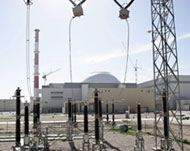UN powers differ on Iran
Envoys from the top five UN powers, plus Germany, said late on Tuesday that a firm international response is needed over Iran’s nuclear programme, but remained at odds over what measures to take.

The statement from the envoys came after a meeting in Paris ended without agreement.
The talks were the first among senior representatives of Britain, China, France, Russia and the United States, as well as Germany, since the International Atomic Energy Agency (IAEA) told the Security Council last Friday that Iran was in breach of a UN demand to halt uranium enrichment.
Nicholas Burns, the number three in the US State Department, said after the meeting with counterparts from the other countries that “all agreed that the Iran nuclear programme should be suspended, and agreed to begin Security Council debate and start negotiating a resolution for suspension”.
The UN Security Council is due to discuss the issue on Wednesday afternoon.
Divisions
Burns voiced frustration with permanent Security Council members Russia and China which are opposing the United States and its EU allies.
 |
|
Iran is accused of secretly |
“It’s time for countries to take responsibilities, especially those countries that have close relationships with Iran,” he said.
Further negotiations were to take place in coming days, with foreign ministers gathering in New York next Monday with the aim of producing a UN resolution acceptable to all.
The United States, backed by Britain, France and Germany, fear Iran is on the path to building a nuclear arsenal under cover of developing atomic energy and wants to invoke Chapter 7 of the UN’s Charter, a passage that would open the way for sanctions and eventually even force a way to freeze its activities.
But Moscow and Beijing, which are major trading partners with oil-rich Iran, are calling instead for a softer approach.
US threat
John Bolton, the US ambassador to the UN, said on Tuesday that if a tough resolution was stymied, his country was ready to form a coalition of allies to impose sanctions outside of a UN mandate.
|
“It has been agreed to pursue discussions, in particular in New York, with the aim of reaching a firm decision from the UN Security Council and addressing a clear message to Iran” Jean-Baptiste Mattei, |
“If we were faced with a veto by one of the permanent members, if for whatever reason the council couldn’t fulfil its responsibilities, then I think it would be incumbent on us, and I’m sure we would press ahead to ask other countries or other groups of countries to impose those sanctions,” Bolton told a congressional committee in Washington.
Jean-Baptiste Mattei, the French foreign ministry spokesman, said the six countries involved in the Paris meeting agreed that Iran’s nuclear programme “is not compatible with the demands of the international community” and were concerned at its development.
He added: “It has been agreed to pursue discussions, in particular in New York, with the aim of reaching a firm decision from the UN Security Council and addressing a clear message to Iran.”
Iranian defiance
But Manuchehr Mottaki, the Iranian foreign minister, said earlier on Tuesday there was no question, “absolutely not”, of Iran suspending its uranium enrichment work, and he predicted China and Russia would block the threat of UN sanctions.
“There is a very wrong assumption held by some that the West can do anything it wants through the Security Council,” he told the Tehran daily Kayhan.
|
“There is a very wrong assumption held by some that the West can do anything it wants through the Security Council” Manuchehr Mottaki, |
At the same time, Gholam Reza Aghazadeh, the head of Iran’s Atomic Energy Organisation, said Iran had succeeded in enriching uranium to a higher level of purity than previously achieved.
The grade reached – 4.8% purity – would not be exceeded because “this level suffices for making nuclear fuel”, he said.
Iran says its nuclear activities are exclusively for developing atomic energy.
Purity of more than 90% is required to produce the fissile core of an atom bomb, a weapon Western intelligence assessments say Iran is at least seven years from being able to build.